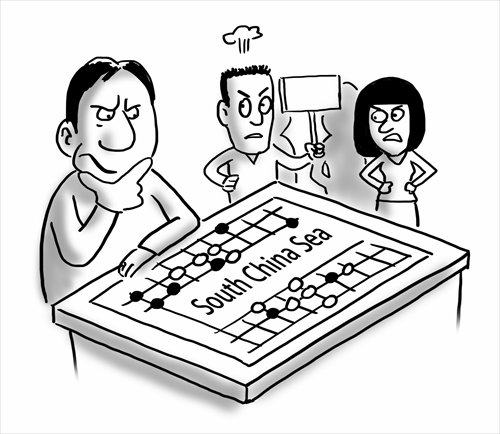HOME >> OP-ED
Hanoi finds balance in post-arbitration era
By Zhou Fangyin Source:Global Times Published: 2016/7/28 16:28:00

Illustration: Liu Rui/GT
After an arbitral tribunal announced its final award on the South China Sea dispute in mid-July, a lot of scrutiny has been paid to the responses of different countries. As a major claimant to the disputed islands, Vietnam made a gesture of caution and non-antagonism in both government statements and state media reports. Many observers were taken by surprise by Hanoi's restraint because as one of the two prominent rival claimants with China, Vietnam should have spoken out for the Philippines.
Contrary to the discretion of the government, Vietnamese public opinion has heaped scathing criticisms upon China. Demonstrations were launched by activists in Hanoi and Ho Chi Minh City on July 17 in a protest against China's denunciation of the award. Vietnam's Internet is rife with inflammatory anti-China comments, such as calling for a boycott of Chinese actors and actresses who support China's official stance on the South China Sea, which resulted in the suspension of a Chinese TV drama in a Vietnamese province.
The stark contrast between Vietnam's official prudence and public's resentment reflects the fact that Vietnam has limited and awkward wiggle room to maneuver when it comes to the South China Sea disputes. Hanoi must keep a clear mind on the South China Sea disputes. Its policy and stance should serve the country's long-term interests, which require meticulous calculation and consideration.
The Vietnamese government might have reconciled itself to the fact that the mounting international pressure will not shift China's position over the award of the arbitration. Instead, more push will escalate tensions and make the knot harder to untie.
Hanoi agrees with the new Philippine government's flexible and artful tactics to deal with China: With the legacy of the arbitration presented by his predecessor, President Rodrigo Duterte has made a gesture of good will, hoping the Philippines and China can resume bilateral talks and engage in further economic cooperation. In this circumstance, if Hanoi speaks out against China even louder than Manila, China will redirect pressure from the Philippines to Vietnam, and the Philippines could benefit in economic terms from a relatively relaxed relationship with China.
As an avid claimant, Vietnam has a major concern: The South China Sea dispute, in nature a reflection of power game between China and the US, might be marginalized if both powerhouses compromise with each other over greater problems.
Theoretically speaking, it is possible that in the future, Beijing and Washington could use the South China Sea as a bargaining chip for a strategic transaction. Thus, desiring support from the US, Vietnam has been treading carefully on the South China Sea dispute and trying to avoid becoming deeply involved in the major power game. If not at the end of its rope, Hanoi won't risk a showdown with China over the territorial and maritime disputes.
Although the arbitration result is unfavorable for China, it doesn't mean it supports Vietnam's claims. Actually, if the verdict applies to Vietnam's case, the country will have to bear great losses because the "islands" it controls have been redefined as rocks and low-tide elevations by the award, and many of its occupations are within the exclusive economic zone or continental shelf of the Philippines. The award has put Vietnam in a dilemma.
Another dilemma Vietnam has to face is the divergence between a restrained government and a feverish nationalistic public discourse over the case. Nationalism has been a characteristic of Vietnam's public opinion in recent decades. It helped the nation regain independence from France and the US, but it also egged the country on to be aggressive and expansionistic during the 1970s, which ended with complete failure.
Some observers argue that amid the escalating tensions, the Vietnamese government is trying to have it both ways between China and the US, but the Vietnamese do not consider China, the US, or ASEAN accountable. In this scenario, nationalism rises again and it needs to be vented out.
Meanwhile, it needs to be noted that even though nationalism prevails on the Vietnamese Internet, few remarks have called for a physical confrontation with China. It shows the Vietnamese netizens know clearly that Vietnam stands no chance in a war with China, and China's moves in the South China Sea do not pose a life-and-death threat to Vietnam.
How to properly guide the people's thought should warrant particular attention from the Vietnamese government. All relevant countries must keep in mind that nationalism shouldn't kidnap the problem-solving process of the South China Sea dispute.
The author is a professor at Guangdong Institute for International Studies. opinion@globaltimes.com.cn
Posted in: Asian Review